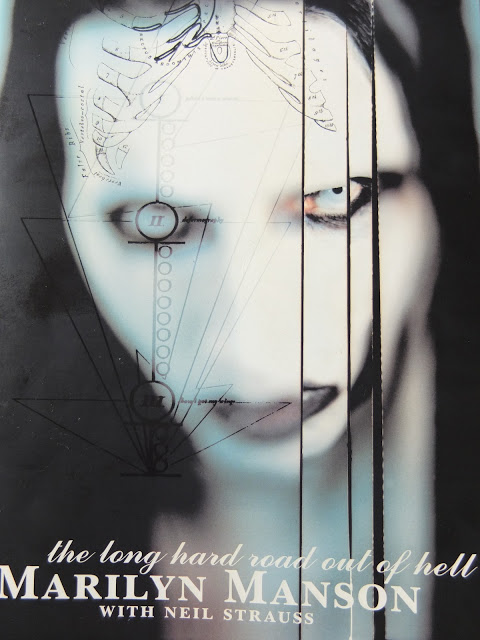 It is generally agreed that Marilyn Manson’s phenomenon is more interesting than Marilyn Manson’s music. If you yourself agree, you may want to read this book, which is all phenomenon and zero music.
It is generally agreed that Marilyn Manson’s phenomenon is more interesting than Marilyn Manson’s music. If you yourself agree, you may want to read this book, which is all phenomenon and zero music.
Published in 1998, shortly before the release of Mechanical Animals, it tells the story of a young boy called Brian Warner, who escaped a childhood of decorum and religion, embraced drugs and satanism, and — after a failed writing career — found his true calling in music (to torture a Clive Barker quote, writing is masturbation, while playing in a band is an orgy). Somewhere along the way he has an epiphany: there there were worse things than being rejected by the cool kids. Being accepted by the cool kids, perhaps. Like Antichrist Superstar, this book has three parts, and with the final part documenting the aforementioned album’s creation and the beginnings of nationwide controversy.
I don’t hate Manson, but I don’t pity him, either. Yes, he was subject to many defamatory attacks, and he was blamed for many things that weren’t his fault…but he has profited handsomely from the controversy, too. He sure as fuck didn’t become the most famous rockstar in America because his music was good.
The book was co-written with Neil Strauss, who is a talented writer — relentless at paring away the rind and getting straight to the interesting parts. If Strauss was a DVD player he’d skip over the movie’s opening credits, start you in the middle of the first action scene, and fast forward through all the dialogue at 3x speed. Reading his books can be exhausting because he throws so much stuff at you so quickly.
The book is full of interesting moments — Brian describes his run-ins with police, his meeting with Anton Szander LaVey, and provides some affidavits from the American Family Association that make him sound like the worst monster of the 21st century (I’m sure he appreciates this very much). I wish there had been fewer random groupie sex stories, and more about Trent Reznor. For a while it seems the working relationship between the two men is building to something big, but the expected payoff doesn’t occur.
The book finds time for lots of philosophising. The revelation Manson has is that nobody is pure, and that it’s all a charade. The Holy Hannah schoolteacher who kept softcore erotica books in her desk drawer. The much loved uncle who had a huge collection of bestiality porn. Everybody has skeletons in their closet. You will think of the verse from the Bible that talks about tombs: beautiful and whitewashed from the outside, dark and seething with corruption on the inside.
Manson has no filter. He talks shit about records labels, old bandmates, current bandmates, and, most of all, himself. His honesty is appealing. Whether he’s poking fun at Daisy Berkowitz’s stupidity (“hey, this album’s about Jesus going on a rock tour, right?”), or outlining his attempt at murdering at ex-girlfriend, he is always direct and blunt. Despite the outlandish content of Hell, it seems more trustworthy than many biographies I read. If this is the expurgated and censored version of Manson’s life, then I don’t want to know about the things that were left out. Manson has always had things to say, but usually those things dance an awkward two-step to (and with) musical accompaniment. Now, the message is unfettered and free.
No Comments »
Comments are moderated and may take up to 24 hours to appear.
No comments yet.
